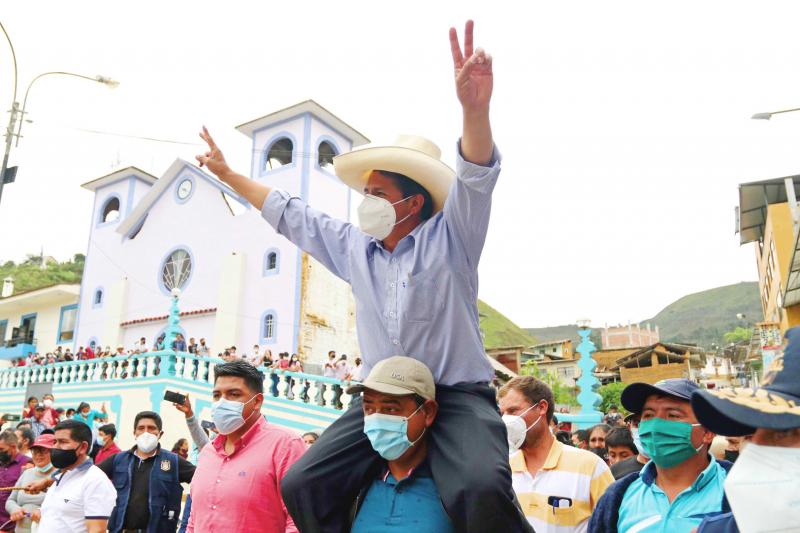Ballots on Sunday were being counted in the Peruvian presidential elections destined for a run-off with no candidate able to fire up the nation during its deadliest week of the COVID-19 pandemic to date.
About 25 million people were eligible to vote — which is mandatory — the day after Peru reported its highest-ever daily toll in the pandemic.
With 16 percent of the votes counted by early Monday, far-left labor unionist Pedro Castillo took a lead among 18 candidates with 15.7 percent — much higher than polls had predicted, but far short of the 51 percent required to avoid a run-off to take place on June 6.

Photo: EPA-EFE
In second place was rightist economist Hernando de Soto with 14.4 percent, the Peruvian National Organism for Electoral Processes (ONPE) said.
The two candidates with the most votes are to stand in the second round.
Almost one-third of voters had declared themselves undecided ahead of what Ipsos Peru head Alfredo Torres said was the country’s “most fragmented election” ever.
Many said that they turned out, despite fear of infection, merely to avoid the fine for not voting.
“We are afraid of getting infected, because this pandemic is terrible, but at the same time I have to vote,” Nancy Retamozo, 58, said as she waited in line at a school in Lima.
As some Peruvians lined up to vote on Sunday, others waited in line for oxygen refills for ill relatives battling COVID-19.
“It is unfair, because instead of being there in the voting line, we had to get up at daybreak to fetch oxygen,” Micaela Lizama, 38, said.
Mario Tinoco, 52, said that he was willing to risk the fine for not voting because “I have to get oxygen; that is the main thing for me.”
Despite the pandemic outlook, election campaigning had continued until Thursday, with candidates drawing hundreds of followers to often boisterous rallies.
The early count showed ultra-conservative celibate Catholic Rafael Lopez Aliaga in third place, followed by corruption-accused populist Keiko Fujimori, who was lagging by fewer than 4 percentage points behind frontrunner Castillo.
“I don’t want to vote, because there is no suitable candidate, but I am more afraid of radicals entering the government,” Johnny Samaniego, 51, said.
Also in the running were center-right Yonhy Lescano, leftist anthropologist Veronika Mendoza and former soccer goalkeeper George Forsyth, who had also contracted COVID-19.
Counting all of the votes will take a while, and the official announcement on the final two candidates might only come early next month, the Peruvian National Jury of Elections said.
The uncertain outcome had the markets worried, and the Peruvian sol last month plunged to a record low 3.8 to the US dollar, adding to the future president’s full inbox.
Peru has been in recession since the second quarter of last year after virus lockdowns shuttered businesses and crippled the tourism sector.
Its economy contracted more than 11 percent last year, 4 million people lost their jobs and another 5 million dropped into poverty.

Four people jailed in the landmark Hong Kong national security trial of "47 democrats" accused of conspiracy to commit subversion were freed today after more than four years behind bars, the second group to be released in a month. Among those freed was long-time political and LGBTQ activist Jimmy Sham (岑子杰), who also led one of Hong Kong’s largest pro-democracy groups, the Civil Human Rights Front, which disbanded in 2021. "Let me spend some time with my family," Sham said after arriving at his home in the Kowloon district of Jordan. "I don’t know how to plan ahead because, to me, it feels

‘A THREAT’: Guyanese President Irfan Ali called on Venezuela to follow international court rulings over the region, whose border Guyana says was ratified back in 1899 Misael Zapara said he would vote in Venezuela’s first elections yesterday for the territory of Essequibo, despite living more than 100km away from the oil-rich Guyana-administered region. Both countries lay claim to Essequibo, which makes up two-thirds of Guyana’s territory and is home to 125,000 of its 800,000 citizens. Guyana has administered the region for decades. The centuries-old dispute has intensified since ExxonMobil discovered massive offshore oil deposits a decade ago, giving Guyana the largest crude oil reserves per capita in the world. Venezuela would elect a governor, eight National Assembly deputies and regional councilors in a newly created constituency for the 160,000

North Korea has detained another official over last week’s failed launch of a warship, which damaged the naval destroyer, state media reported yesterday. Pyongyang announced “a serious accident” at Wednesday last week’s launch ceremony, which crushed sections of the bottom of the new destroyer. North Korean leader Kim Jong-un called the mishap a “criminal act caused by absolute carelessness.” Ri Hyong-son, vice department director of the Munitions Industry Department of the Party Central Committee, was summoned and detained on Sunday, the Korean Central News Agency (KCNA) reported. He was “greatly responsible for the occurrence of the serious accident,” it said. Ri is the fourth person

Poland is set to hold a presidential runoff election today between two candidates offering starkly different visions for the country’s future. The winner would succeed Polish President Andrzej Duda, a conservative who is finishing his second and final term. The outcome would determine whether Poland embraces a nationalist populist trajectory or pivots more fully toward liberal, pro-European policies. An exit poll by Ipsos would be released when polls close today at 9pm local time, with a margin of error of plus or minus 2 percentage points. Final results are expected tomorrow. Whoever wins can be expected to either help or hinder the